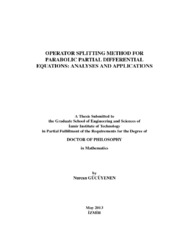Please use this identifier to cite or link to this item:
https://hdl.handle.net/11147/2947Full metadata record
| DC Field | Value | Language |
|---|---|---|
| dc.contributor.advisor | Tanoğlu, Gamze | - |
| dc.contributor.author | Gücüyenen, Nurcan | - |
| dc.date.accessioned | 2014-07-22T13:48:39Z | - |
| dc.date.available | 2014-07-22T13:48:39Z | - |
| dc.date.issued | 2013 | - |
| dc.identifier.uri | http://hdl.handle.net/11147/2947 | - |
| dc.description | Thesis (Doctoral)--Izmir Institute of Technology, Mathematics, Izmir, 2013 | en_US |
| dc.description | Includes bibliographical references (leaves: 78-83) | en_US |
| dc.description | Text in English; Abstract: Turkish and English | en_US |
| dc.description | x, 88 leaves | en_US |
| dc.description.abstract | This thesis presents the consistency, stability and convergence analysis of an operator splitting method, namely the iterative operator splitting method, using various approaches for parabolic partial differential equations. The idea of the method is based first on splitting the complex problems into simpler equations. Then, each sub-problem is combined with iterative schemes and efficiently solved with suitable integrators. The analyses are based on the type of the operators of the problems. When the operators are bounded, the consistency is proved in two ways: first from derived explicit local error bounds and the second using the Taylor series expansion after combining iterative schemes with midpoint rule. As for the unbounded operators, since the Taylor series expansion is no longer valid, the consistency is derived using C0 semigroup theory. The stability is presented by constructing stability functions for each iterative schemes when the operators are bounded. For the unbounded, two stability analyses are offered: first one uses the continuous Fourier transform and the second uses semigroup theory. Lax- Richtmyer equivalence theorem and Lady Windermere’s fan argument which combine the stability and consistency are proposed for the convergence. In the computational part, the method is applied to three linear parabolic PDEs and to Korteweg-de Vries equation. These three equations are capillary formation model in tumor angiogenesis, solute transport problem and heat equation. Finally, numerical results are presented to illustrate the high accuracy and efficiency of the method relative to other classical methods. These numerical results align with the obtained theoretical results. | en_US |
| dc.language.iso | en | en_US |
| dc.publisher | Izmir Institute of Technology | en_US |
| dc.rights | info:eu-repo/semantics/openAccess | en_US |
| dc.subject.lcsh | Differential equations, Parabolic | en |
| dc.subject.lcsh | Partial differential operators | en |
| dc.title | Operator Splitting Method for Parabolic Partial Differential Equations: Analyses and Applications | en_US |
| dc.type | Doctoral Thesis | en_US |
| dc.institutionauthor | Gücüyenen, Nurcan | - |
| dc.department | Thesis (Doctoral)--İzmir Institute of Technology, Mathematics | en_US |
| dc.relation.publicationcategory | Tez | en_US |
| dc.identifier.wosquality | N/A | - |
| dc.identifier.scopusquality | N/A | - |
| item.openairecristype | http://purl.org/coar/resource_type/c_18cf | - |
| item.openairetype | Doctoral Thesis | - |
| item.languageiso639-1 | en | - |
| item.cerifentitytype | Publications | - |
| item.grantfulltext | open | - |
| item.fulltext | With Fulltext | - |
| Appears in Collections: | Phd Degree / Doktora | |
Files in This Item:
| File | Description | Size | Format | |
|---|---|---|---|---|
| T001111.pdf | DoctoralThesis | 1.21 MB | Adobe PDF |  View/Open |
CORE Recommender
Page view(s)
126
checked on Apr 28, 2025
Download(s)
182
checked on Apr 28, 2025
Google ScholarTM
Check
Items in GCRIS Repository are protected by copyright, with all rights reserved, unless otherwise indicated.